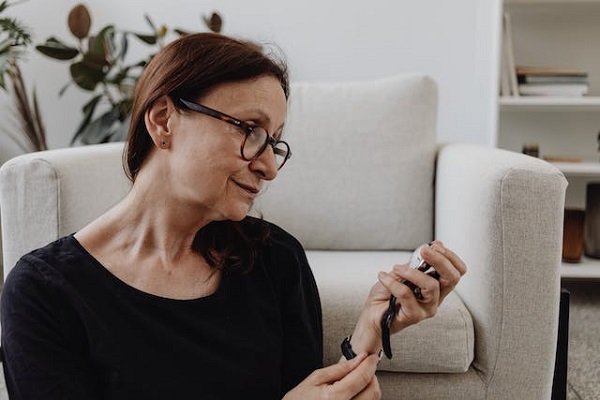When a woman stops having menstrual periods, permanently, she is said to have reached a stage of life called menopause. Menopause is also called as ‘change of life;’ it signals the end of a woman’s ability to have children. The use of the term menopause, as a norm, refers to the period, or time, when a woman’s hormone levels start to change. Menopause also denotes complete stoppage of menstrual periods for one continuous year. The transition phase before menopause is referred to as perimenopause, where the stock of mature eggs in a woman’s ovaries diminishes and ovulation becomes irregular, just as the production of oestrogen and progesterone decreases. A big drop in oestrogen levels triggers most of the symptoms of menopause.
KM presented with hot flashes and excess overnight sweat, which totally soaked her bed and pillow. She appeared the apprehensive type with anticipatory anxiety. When I queried about her symptoms, including her menses, or periods, she whispered that the latter were, more or less, ‘regular and steady,’ but occasionally not. Her reminiscence, or account, was all a little blurred. I, therefore, referred her case to a gynaecologist and sought her specialist guidance.
When I began to document her symptoms, she said that she did not think that she was the same person any more — she had put on more than a padding of fat to her waist. She also said that she would get perturbed with small things at home, or the workplace. She reported that she had, for no real reason, started to look at people, who she knew for years, in a ‘dissimilar light.’ Her husband added, “It looks as if, for a loving person, my wife seems to be getting far too detached, or even remote, and she is not as loving as she was to us before — me and our son and daughter.”
I explained to KM that certain bodily and hormonal changes begin at perimenopause. This could include a deliberate, but a ‘sure’ waning in progesterone, although oestrogen remains more or less the same, or may markedly increase. The latter often ‘clues’ up to what is called ‘oestrogen dominance,’ bringing on symptoms, such as bloating [water retention, leading to weight gain around the waist], irregular periods, reduced sex drive, mood swings and ‘migraine-type’ of headaches before periods, which KM complained of, although parenthetically.
Nature has contrived a woman’s physiology so amazingly that the body attempts to offset the resultant oestrogen ‘excess,’ during perimenopause. It is, therefore, a question-mark when one describes symptoms of oestrogen ‘overload,’ conventional medicine prescribes ‘more’ oestrogen. The effect is counterproductive: what were insignificant symptoms earlier may only get bad, or worse.
I first prescribed her blue cohosh [Cimicifuga racemosa], a supplement, along with flaxseed, calcium, and red clover. As my ‘guru,’ Dr Richard Firshein, DO, puts it, “Dried root of black cohosh, a flowering plant has for long been a valued remedy for many ailments of the female reproductive system. From the pain of PMS to the struggle of childbirth and the discomfort of menopause, black cohosh is an herbal rescue remedy, normalising the constantly fluctuating hormones that characterise a woman’s monthly menstrual cycle.” There was tangible improvement with her symptoms in 4-5 months.
In addition to that, I thought of a homeopathic perspective. Homeopathy is mind-body medicine. It does not simply look at a given, or not given, illness, or ‘register’ our body as being composed only of parts. It looks at the sum of the parts, as one whole. In other words, homeopathy treats the mind, body and soul. Not just the ‘illness’ state.
Homeopathy also pays the greatest consideration to the exact symptom-picture and personality portrayal of each individual — in this context, KM presenting with menopausal symptoms. It evaluates every woman’s personality, likes, or dislikes, emotional and psychological patterns, sensibilities and sensitivities, including relationships. This includes their family and medical history, such as age of menarche [first periods], age of onset of symptoms, sudden or gradual menstrual problems, pregnancy, change in weight, environment, occupation, or lifestyle. Or, moods, or hot flushes — better, or worse, when, at what time, and so on — besides prompting information on the use of conventional, or other, medications and oral contraceptive [OC] pills. Homeopathy also evidences that each of us is as distinctive as our signature, or fingerprint.
I now prescribed KM, the homeopathic remedy, Sepia officinalis 200C, which is principally allied to the female sexual and reproductive organs — vagina, uterus and ovaries. From the emotional perspective, women who illustrate the ‘remedy-picture,’ or the Sepia ‘personality,’ are all by themselves. They are belligerent to the point of being daunting, or even distant to people who one ought to love best — in other words, one’s family and children, or loved ones.
Sepia personalities also appreciate all the natural nuances of life, with the aptitude to ‘let go,’ even if they ‘let go’ of hurt with difficulty. They may absolve; but, they will never forget.
When KM called six weeks later, she told me that her hot flashes, sweats, as also sleeplessness, had eased significantly. She was more calm than she was before. Her erratic mood swings were gone; she said that she was now ‘more’ accepting of certain unsolved emotional issues. She reported that her concern — ‘she’s not what she was before’ — was a thing of the past in her relationships, especially with her family and friends, among others.

